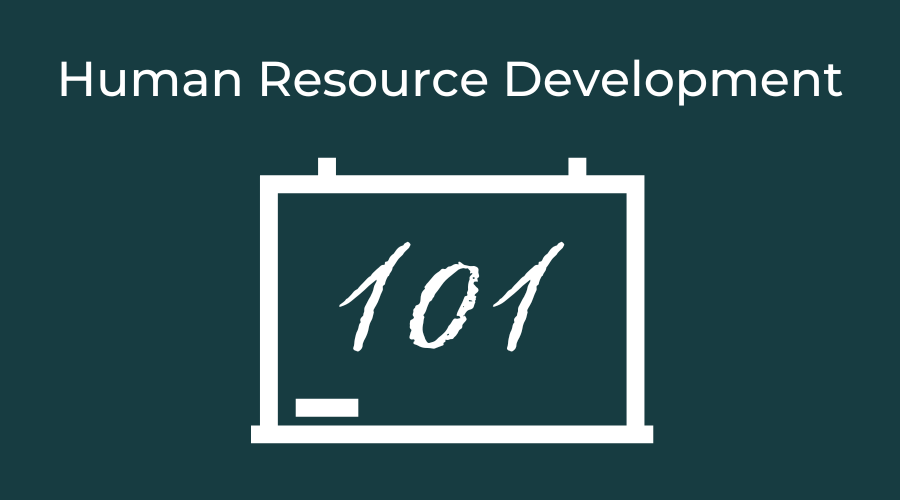
Human Resources Development 101
Human resource development, also referred to as HRD, is the process of improving the performance of individuals and teams within an organization through planned learning activities. It is a systematic approach to developing the knowledge, skills, and abilities of employees in order to achieve organizational goals.
HRD encompasses a wide range of activities, including:
- Employee training: This is the most common form of HRD, and it involves providing employees with the knowledge and skills they need to perform their jobs effectively.
- Career development: This involves helping employees identify their career goals and providing them with the resources they need to achieve those goals.
- Performance management: This involves setting performance goals for employees and providing them with feedback on their performance.
- Coaching and mentoring: This involves providing employees with one-on-one support to help them develop their skills and abilities.
- Organizational development: This involves helping organizations improve their effectiveness by changing their culture, structure, or processes.
Human resource development is important for a number of reasons. First, it can help organizations to improve their productivity and profitability. Second, it can help organizations to attract and retain top talent. Third, it can help organizations to be more adaptable to change.
There are a number of different ways to implement HRD. Some organizations use a formal approach, with a dedicated HRD department that is responsible for developing and delivering training programs. Other organizations use a more informal approach, with training and development being delivered by line managers or other employees.

Human Resource Development Software
There are a number of software solutions that can help with human resource development process. These solutions can help organizations to:
- Track employee training and development progress: This can help organizations to ensure that employees are receiving the training they need to be successful in their roles.
- Create and deliver training programs: This can help organizations to save time and money by automating the training development process.
- Measure the effectiveness of training programs: This can help organizations to ensure that their training programs are meeting their objectives.
- Manage employee career development: This can help organizations to help employees identify their career goals and develop the skills they need to achieve those goals.
- Provide performance management feedback: This can help organizations to provide employees with feedback on their performance and help them to identify areas where they can improve.
- Coach and mentor employees: This can help organizations to provide employees with one-on-one support to help them develop their skills and abilities.
Some of the most popular human resource development software solutions include:
- Cornerstone OnDemand: This solution offers a comprehensive suite of HRD features, including training management, performance management, and career development.
- SAP SuccessFactors: This solution is another comprehensive HRD solution that offers a wide range of features.
- Oracle Taleo: This solution is a popular choice for organizations that need to manage global workforces.
- ADP Workforce Now: This solution is a good option for small and medium-sized businesses.
- Gusto: This solution is a cloud-based HRD solution that is easy to use and affordable.
When choosing an HRD software solution, it is important to consider the specific needs of your organization. Some factors to consider include the size of your organization, the types of training you need to deliver, and your budget.
Future of Human Resource Development
The addition of generative AI into the market has the potential to significantly impact human resource development in several ways:
-
Training and Skill Development: Generative AI can provide personalized and interactive training experiences for employees. It can create simulated scenarios, virtual environments, or role-playing exercises that allow employees to practice and enhance their skills in a risk-free setting. This technology can also generate realistic case studies, problem-solving challenges, and adaptive learning programs tailored to individual employees' needs, accelerating their professional development.
-
On-Demand Learning: Generative AI can enable on-demand learning by providing instant access to vast amounts of information and expertise. Employees can interact with AI-powered chatbots or virtual assistants that can answer questions, provide guidance, and offer real-time feedback. This facilitates continuous learning, enabling employees to quickly acquire knowledge and skills whenever they need them, improving their productivity and adaptability.
-
Talent Acquisition and Assessment: Generative AI can streamline the talent acquisition process by automating certain aspects of candidate evaluation. AI-powered algorithms can analyze resumes, assess skill sets, and identify the best-fit candidates for specific roles. Additionally, AI-based tools can conduct simulations or role-specific tests to evaluate candidates' capabilities. This can save time for HR professionals, allowing them to focus on more strategic aspects of talent acquisition and reducing bias in the hiring process.
-
Employee Engagement and Well-being: Generative AI can contribute to employee engagement and well-being by personalizing the employee experience. AI-powered systems can analyze individual preferences, work patterns, and performance data to offer personalized recommendations for career development, goal setting, and work-life balance. Furthermore, AI can help identify signs of employee burnout or disengagement by analyzing sentiment, productivity, and communication patterns, allowing HR professionals to intervene and provide support in a timely manner.

Just remember that while generative AI can bring valuable enhancements to human resource development, it should be implemented ethically and responsibly. Safeguards must be in place to ensure data privacy, address potential biases, and maintain human oversight to make informed decisions.
Ultimately, the successful integration of generative AI in HR development will require a thoughtful and balanced approach that combines the power of AI with human expertise and empathy.
We will be watching.


